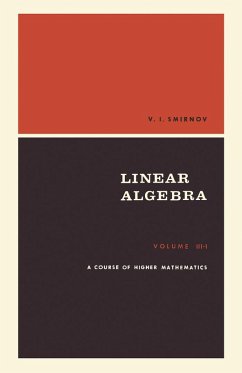Linear Algebra: A Course of Higher Mathematics, Volume III, Part I deals with linear algebra and the theory of groups that are usually found in theoretical physics.
This volume discusses linear algebra, quadratic forms theory, and the theory of groups. The properties of determinants are discussed for determinants offer the solution of systems of equations. Cramer's theorem is used to find the solution of a system of linear equations that has as many equations as unknowns. Linear transformations and quadratic forms, for example, coordinate transformation in three-dimensional space and general linear transformation of real three-dimensional space, are considered. The formula for n-dimensional complex space and the transformation of a quadratic form to a sum of squares are analyzed. The latter is explained by using Jacobi's formula to arrive at a significant form of the reduction of a quadratic form to a sum of squares. The basic theory of groups, linear representations of groups, and the theory of partial differential equations that is the basis of the formation of groups with given structural constants are explained.
This book is recommended for mathematicians, students, and professors in higher mathematics and theoretical physics.
This volume discusses linear algebra, quadratic forms theory, and the theory of groups. The properties of determinants are discussed for determinants offer the solution of systems of equations. Cramer's theorem is used to find the solution of a system of linear equations that has as many equations as unknowns. Linear transformations and quadratic forms, for example, coordinate transformation in three-dimensional space and general linear transformation of real three-dimensional space, are considered. The formula for n-dimensional complex space and the transformation of a quadratic form to a sum of squares are analyzed. The latter is explained by using Jacobi's formula to arrive at a significant form of the reduction of a quadratic form to a sum of squares. The basic theory of groups, linear representations of groups, and the theory of partial differential equations that is the basis of the formation of groups with given structural constants are explained.
This book is recommended for mathematicians, students, and professors in higher mathematics and theoretical physics.
Dieser Download kann aus rechtlichen Gründen nur mit Rechnungsadresse in A, B, BG, CY, CZ, D, DK, EW, E, FIN, F, GR, HR, H, IRL, I, LT, L, LR, M, NL, PL, P, R, S, SLO, SK ausgeliefert werden.









